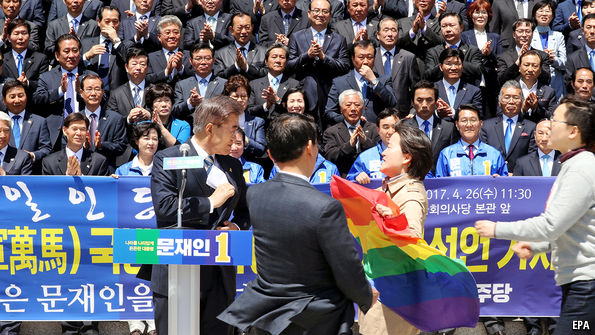Shameful How South Korean’s Pols. are Using Homophobia
“IT IS 2017. Moon Jae-in just opposed homosexuality,” thundered the headline of a newspaper following a live television debate among South Korea’s presidential candidates. Gay sex is legal in South Korea, but stigmatised. Mr Moon, a former human-rights lawyer and the liberal candidate, who leads the polling for the election on May 9th, had just confirmed that he disapproved of it.
Mr Moon’s statement caused a stir on social media, but his view is not that unusual. Of the five main presidential candidates, only Shim Sang-jung of the Justice Party, the only woman running, has expressed support for gay rights. A decade ago a bill outlawing discrimination on various grounds foundered because sexual orientation was one of them. MPs have blocked it twice more since then. Last week representatives of Mr Moon and three rivals attended a “Protestant Public Policy Forum”; all made statements against gay rights, in keeping with the stance of many of South Korea’s influential churches.
The denunciations come on the heels of a report from an NGO called the Military Human Rights Centre of Korea, which claims that the army is “hunting down” gay soldiers. The Military Criminal Act bans soldiers, most of whom are conscripts, from engaging in gay sex, which it labels “disgraceful conduct”, punishable by imprisonment of up to two years. At least 32 soldiers are being investigated and one has been charged. That, the report claims, is because the army is actively seeking to weed out gay soldiers. The report alleges that it obliged gay soldiers to reveal the names of gay comrades, combed their mobile phones for leads and even mounted sting operations using gay dating apps—all of which appear to be against the army’s regulations and may also be illegal.
The army protests that the claims are untrue and that it has not broken the law. Its ban on gay sex, it says, is designed to conserve a “wholesome lifestyle” for soldiers. Han Ga-ram, a human-rights lawyer, says the measure is tantamount to criminalising homosexuality. Activists say it violates the constitution’s guarantee of equal treatment for all citizens. They have challenged it in the constitutional court three times since 2002, to no avail. A fourth complaint is on its way through the courts.
Judges, generals and politicians may be unbending, but public opinion is shifting. Between 2010 and 2014, support for same-sex marriage doubled among respondents in their 20s and 30s; almost three-quarters in their 20s saw gay rights as a human-rights issue. Mr Han says that South Koreans are “less afraid of speaking out” since months of protests led to the impeachment in March of Park Geun-hye, the president, prompting the current election.
Posters have appeared on the walls of universities in Seoul, the capital, calling for the release of the gay soldiers, with the slogan: “Take me away too”. Protesters waving rainbow flags and calling for Mr Moon to apologise disrupted one of his campaign events this week (see picture). In the end, he did, but half-heartedly, saying he should not have been judgmental, but standing by his opposition to greater gay rights. Activists have taken to Gwanghwamun Square, in central Seoul, where, only recently, Mr Moon joined the rallies against Ms Park, presenting himself as a figure of change. Angry banners there now demand of him: “Do you oppose me?”
Mr Moon’s statement caused a stir on social media, but his view is not that unusual. Of the five main presidential candidates, only Shim Sang-jung of the Justice Party, the only woman running, has expressed support for gay rights. A decade ago a bill outlawing discrimination on various grounds foundered because sexual orientation was one of them. MPs have blocked it twice more since then. Last week representatives of Mr Moon and three rivals attended a “Protestant Public Policy Forum”; all made statements against gay rights, in keeping with the stance of many of South Korea’s influential churches.
Latest updates
Judges, generals and politicians may be unbending, but public opinion is shifting. Between 2010 and 2014, support for same-sex marriage doubled among respondents in their 20s and 30s; almost three-quarters in their 20s saw gay rights as a human-rights issue. Mr Han says that South Koreans are “less afraid of speaking out” since months of protests led to the impeachment in March of Park Geun-hye, the president, prompting the current election.
Posters have appeared on the walls of universities in Seoul, the capital, calling for the release of the gay soldiers, with the slogan: “Take me away too”. Protesters waving rainbow flags and calling for Mr Moon to apologise disrupted one of his campaign events this week (see picture). In the end, he did, but half-heartedly, saying he should not have been judgmental, but standing by his opposition to greater gay rights. Activists have taken to Gwanghwamun Square, in central Seoul, where, only recently, Mr Moon joined the rallies against Ms Park, presenting himself as a figure of change. Angry banners there now demand of him: “Do you oppose me?”

Comments